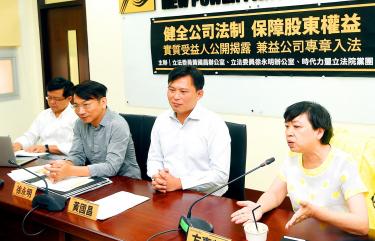The New Power Party (NPP) and civic group representatives yesterday called for rules requiring companies to disclose their beneficial owners and allowing minority shareholders to bring direct actions against board members ahead of a legislative review of draft amendments to the Company Act (公司法) planned for today.
While the Ministry of Economic Affairs has described the bill as an effort to meet international standards against money laundering ahead of a visit by the Asia/Pacific Group on Money Laundering (APG) in November, it could be more than that, NPP Executive Chairman Huang Kuo-chang (黃國昌) told a news conference in Taipei.
“This is an opportunity for Taiwan to build a new legal framework that is in line with global standards — one that is transparent, fair and beneficial to corporate governance, with better mechanisms to protect the rights of shareholders,” Huang said.
Ensuring greater transparency about beneficial ownership is an important step toward achieving market transparency, which would allow the government to uncover illegal business operations, said National Chengchi University College of Law professor Faung Kai-lin (方嘉麟), who has been advocating reform of the act for nearly two years in cooperation with civic groups.
The Democratic Progressive Party (DPP) has refused to tighten rules on beneficial ownership, saying that it does not want to create “unnecessary trouble” for companies, but for 99 percent of companies, registering their beneficial owner would take only five seconds, he said.
“The remaining 1 percent that deliberately try to conceal their beneficial owner would complain about the additional hassle, but without greater transparency about beneficial ownership, Taiwan will probably not pass the APG evaluation,” he added
The draft amendments should also allow minority shareholders to bring direct actions against board members who have violated regulations or encroached upon their rights, National Taipei University law professor Chen Yen-liang (陳彥良) said.
That would not only improve protection of minority shareholders’ rights, but also allow them to act as watchdogs alongside independent directors, he said.
The legislature should use the opportunity of reviewing the act to push for more comprehensive reform, as such opportunities are rare, NPP caucus convener Hsu Yung-ming (徐永明) said, adding that lawmakers should not take half measures.
While the Chinese Nationalist Party (KMT) respects the NPP’s proposals, legislators must distinguish between ideals and reality, KMT caucus secretary-general Lee Yen-hsiu (李彥秀) said.
During the review, the KMT would seek a reasonable balance between government supervision and business practice, she said, urging other parties to also handle the bill with caution.
The DPP supports the draft amendments proposed by the Executive Yuan, but would make minor adjustments based on the results of cross-caucus negotiations, DPP caucus secretary-general Hsu Chih-chieh (許智傑) said.
Additional reporting by CNA
Source: Taipei Times - 2018/07/06





















